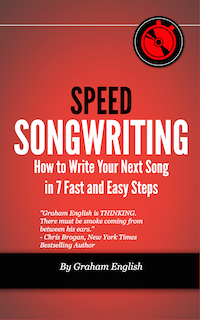
Introduction
Ever wondered why your songwriting process feels like a slow crawl?
You're not alone. Writing a song can be tricky, but it doesn't have to be an uphill battle.
Let's dive into five reasons your songwriting process is slow and, most importantly, how to fix them.
Reason 1: Lack of a Structured Routine
The Power of a Consistent Writing Routine
Having a consistent writing routine is the secret sauce for many successful songwriters. Whether it's setting aside a specific time each day, or designating a particular space for writing, having structure makes a world of difference.
How the Pros Do It
Legendary songwriters like Paul McCartney and Dolly Parton often set aside specific times or environments for their craft. Instead, they prioritize songwriting and stick to their routines despite their hectic schedules.
Crafting Your Personal Routine
To create a routine that works for you, start by determining your most productive hours. Next, establish a dedicated space for songwriting, free from distractions. Finally, set achievable goals for each session, such as writing a verse or coming up with a chorus.
Maintaining Consistency and Discipline
Keep track of your progress and hold yourself accountable. If you miss a session, make it up. The more you practice, the faster your songwriting process will become.
Reason 2: Writer's Block
The Songwriter's Nemesis: Writer's Block
We've all been there—staring at a blank page, unable to conjure up a single word or melody. But, unfortunately, writer's block can be a real speed bump in your songwriting journey.
Causes of Writer's Block
Writer's block often stems from a lack of inspiration, stress, or self-doubt. Identifying the cause can help you find the right solution.
Overcoming Writer's Block
- Brainstorming ideas: Make a list of potential song topics, themes, or lyrics. Remember, quantity leads to quality.
- Freewriting: Set a timer and write non-stop for 10 minutes. This can help unlock your creativity.
- Collaboration: Working with others can bring fresh perspectives and ideas.
- Changing environment: A new setting can spark inspiration and break the block.
Reason 3: Perfectionism
The Downside of Perfectionism in Songwriting
Perfectionism can be a double-edged sword. While it may drive you to create your best work, it can also paralyze your progress. Therefore, learning to strike a balance is critical.
Recognizing Perfectionist Tendencies
Are you constantly editing while writing? Do you struggle to move on from one line or melody? These are signs that perfectionism might be holding you back.
Combating Perfectionism
- Embrace imperfection: Permit yourself to write a "bad" song. Then, you can always revise it later.
- Set realistic goals: Focus on completing smaller tasks rather than creating a masterpiece from the start.
- Progress over perfection: Celebrate your growth and development as a songwriter.
- Permission to make mistakes: Remember, even the most incredible songs went through multiple drafts.
Reason 4: Limited Musical Vocabulary
How Musical Vocabulary Impacts Songwriting
A limited musical vocabulary can make it challenging to craft unique melodies, harmonies, or rhythms. However, expanding your knowledge can lead to more interesting and engaging songs.
Identifying a Limited Musical Vocabulary
If you find yourself constantly using the same chords, scales, or song structures, it's time to broaden your musical horizons.
Expanding Your Musical Vocabulary
- Active listening: Analyze songs from different genres and artists, focusing on chord progressions, melodies, and rhythms. This can help you discover new elements to incorporate into your own music.
- Music theory education: Learn about scales, modes, and harmonies to gain a deeper understanding of the building blocks of music.
- Experimenting with different genres: Dabble in various styles to challenge yourself and uncover new techniques.
- Collaborating with other musicians: Work with artists with diverse backgrounds and skills to learn from their expertise.
Reason 5: Insufficient Inspiration and Motivation
The Fuel of Songwriting: Inspiration
Inspiration is the lifeblood of songwriting. Without it, creating music can feel like a chore. Cultivating a steady stream of inspiration is essential for a smooth songwriting process.
Draining Factors
Burnout, stress, and self-doubt can all sap your motivation, making it challenging to find the energy for songwriting.
Boosting Inspiration and Motivation
- Exploring personal experiences: Draw from your own life to find unique and meaningful stories.
- Drawing inspiration from the world around you: Observe people, places, and events to uncover new ideas.
- Setting achievable goals: Break your songwriting process into manageable steps to maintain motivation.
- Creative cross-training: Engage in other artistic pursuits, like painting or writing poetry, to stimulate your creativity.
Conclusion
By addressing these five reasons, you'll be well on your way to a faster songwriting process.
Embrace a structured routine, overcome writer's block, manage perfectionism, expand your musical vocabulary, and fuel your inspiration.
With time, patience, and persistence, you'll create amazing songs at lightning speed.
FAQs
1. How do I know if my songwriting routine works for me?
If you find that you're consistently making progress and completing songs, your routine is likely effective. However, if you still struggle to write, consider tweaking your routine to suit your needs better.
2. Can I overcome writer's block by taking a break from songwriting?
Sometimes, taking a break can help clear your mind and relieve stress. Just be mindful not to let your break extend indefinitely, as it may hinder your progress.
3. What if I feel like I've already tried everything to expand my musical vocabulary?
Consider exploring even more diverse genres or learning a new instrument. Sometimes, stepping outside your comfort zone can lead to fresh ideas and inspiration.
4. How can I stay motivated when I feel like my songs aren't good enough?
Remember that growth takes time. Focus on the progress you've made, and be patient with yourself. Celebrate small victories, and remind yourself that even your favorite artists started somewhere.
5. Can collaboration help me improve my songwriting speed?
Collaboration can be a great way to learn from others, share ideas, and push your songwriting boundaries. In addition, working with others may help you overcome roadblocks and complete songs faster.

Enter your first name and email address below and click “GET ACCESS NOW!” to get the Speed Songwriting Cheat Sheet delivered to your inbox!
We guarantee 100% privacy. Your information will not be shared.

Leave a Reply